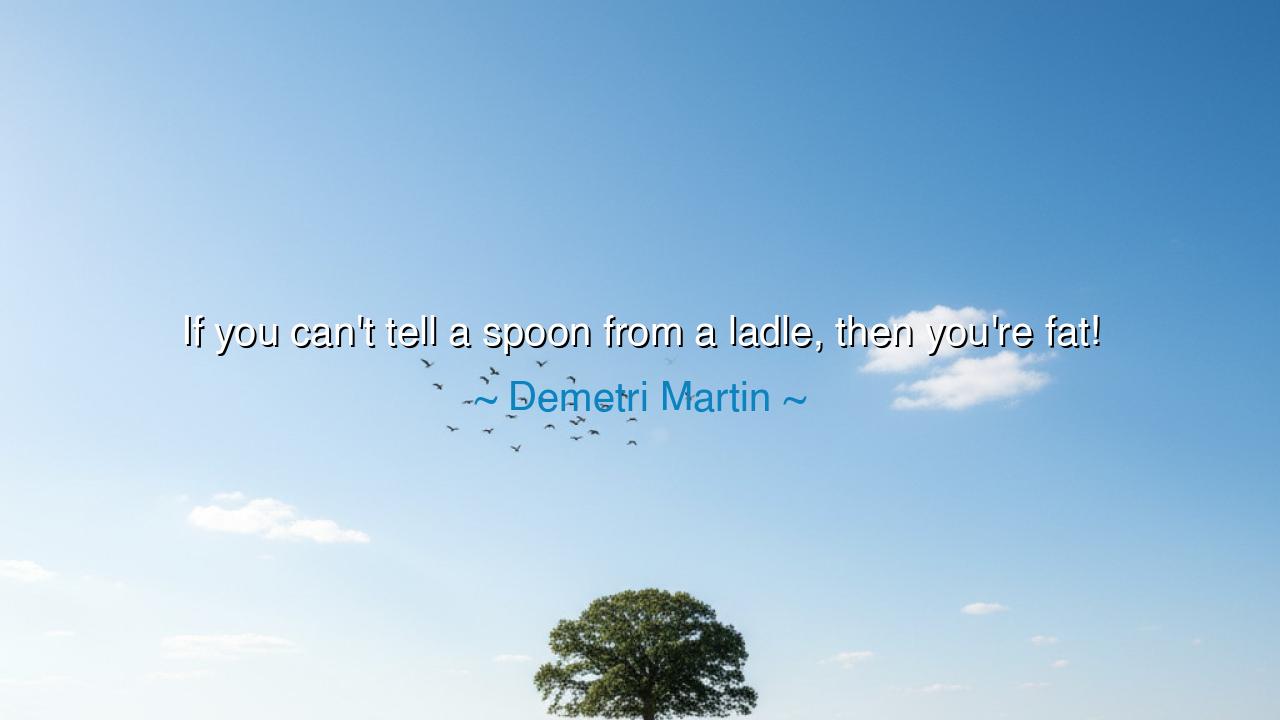
If you can't tell a spoon from a ladle, then you're fat!






“If you can’t tell a spoon from a ladle, then you’re fat!” Thus jested Demetri Martin, the modern philosopher of laughter, whose wit disguises a keen understanding of human nature. Though his words wear the robe of comedy, they conceal beneath it a glimmer of timeless truth. In this strange and humorous saying lies a reflection on excess, self-awareness, and the blindness that comes when indulgence overtakes wisdom. Martin’s laughter, like that of the wise fool in ancient courts, is not meant merely to amuse, but to awaken — to remind us that humor is often the most merciful form of truth.
In the ancient days, gluttony was counted among the great moral failings, not merely because it burdened the body, but because it clouded the spirit. The philosophers of Greece and the mystics of the East all warned of this: that the more one consumes without reflection, the more the senses dull and the soul grows heavy. What Demetri Martin declares with playful absurdity — that one might confuse a spoon for a ladle — is a modern parable for this very blindness. When appetite rules over awareness, perception itself becomes distorted. The ladle, meant for serving others, and the spoon, meant for oneself, merge into one — and we lose the sense of measure.
Martin’s humor springs from exaggeration, but the wisdom within it is real. The man who cannot tell the difference between moderation and excess is not merely one who eats too much; he is one who lives without balance. Whether in food, ambition, wealth, or pleasure, the inability to distinguish between what nourishes and what engulfs is the root of ruin. The “fatness” of which Martin speaks is not only of the body but of the spirit — the heaviness that comes from constant taking, without pause for gratitude or restraint.
Consider the story of Lucullus, the Roman general who, after his victories, built grand feasts that became legendary in history. His banquets overflowed with luxury — flamingo tongues, gilded wine, mountains of honeyed fruit. Yet it was said that Lucullus grew weary even of his pleasures, and his senses dulled under their weight. One evening, when his servants prepared only a modest meal, he rebuked them, saying, “Lucullus dines with Lucullus tonight — and must not dine poorly.” The tale stands as a mirror to Martin’s jest: when one cannot tell hunger from habit, the spoon from the ladle, the measure of joy is lost, and life becomes a banquet without flavor.
In Martin’s age — our age — the banquet has grown digital. We feast upon not only food, but information, attention, and indulgence. We consume endlessly, often without hunger, scrolling through oceans of distraction. The comedian’s joke, though about eating, reaches further — it is a reflection of a culture that has lost its sense of portion. To mistake a ladle for a spoon is to mistake abundance for necessity, to confuse comfort with fulfillment. In this way, the humor becomes prophecy, calling us to rediscover the wisdom of enough.
Yet there is compassion in Martin’s laughter. He does not condemn; he reveals. The power of his humor lies in its gentleness — for laughter opens the heart where criticism hardens it. By making us laugh at our own excess, he allows us to see our folly without shame. This, too, is an ancient art: the satirist as sage, the jester as teacher. Through laughter, the truth becomes bearable. We smile, and in that smile, we awaken to ourselves.
So, dear listener, learn the lesson beneath the jest. Know the difference between the spoon and the ladle. Learn to discern what is enough for the moment, and what belongs to others. Feed your body, but also your mind and soul — and do not let any one appetite consume the rest. Moderation is not denial; it is mastery. It is the art of tasting life fully without being swallowed by it.
Therefore, let this saying of Demetri Martin be remembered not as mere comedy, but as wisdom disguised in mirth. For those who cannot tell the spoon from the ladle will find themselves forever hungry, no matter how much they consume. But those who eat, think, and live with awareness will find that even the smallest spoonful — taken with gratitude — can satisfy the soul. Laughter is the mirror, and moderation the lesson. Let both guide you well.






AAdministratorAdministrator
Welcome, honored guests. Please leave a comment, we will respond soon